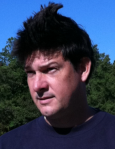Finding Your Passion
 Jeff is a typical male--he
loves sports. He likes watching it above
all else on TV, especially our beloved Tar Heels, and especially while eating
snacks and drinking beer. He loves to love UNC and hate Duke and Coach K, the weasel.
Jeff is a typical male--he
loves sports. He likes watching it above
all else on TV, especially our beloved Tar Heels, and especially while eating
snacks and drinking beer. He loves to love UNC and hate Duke and Coach K, the weasel.  He tailgates at every USC home football game with his law school buddies.
Because he played soccer as a child and teen, he also follows college and pro
soccer and watches it relentlessly on TV while all those around him are bored to
death and clueless about what is happening. He tivo-es every soccer, basketball
and football game of his favorite teams and will not let anyone tell him the
outcome until he has had the opportunity to watch them himself.
He tailgates at every USC home football game with his law school buddies.
Because he played soccer as a child and teen, he also follows college and pro
soccer and watches it relentlessly on TV while all those around him are bored to
death and clueless about what is happening. He tivo-es every soccer, basketball
and football game of his favorite teams and will not let anyone tell him the
outcome until he has had the opportunity to watch them himself.
Much of what I have learned
from Jeff though, has come from his love of soccer. He chose soccer as his
sport right off. When he was old enough to
begin on Y teams, he and a lot of his friends signed up for soccer, which their
fathers had never played and knew nothing about. It was a new sport in the
South and had just begun to challenge football. So the boys took their first
step toward independence, though short lived. Irmo area fathers bought up all
the Soccer for Dummies
books and
began to learn about offside and corner kicks and yellow cards and soon were coaching
the teams their sons were on or yelling at the coaches of the teams their sons were on.
Jeff played classic league
soccer in middle school, which gave him the opportunity to play teams from
other states. He traveled to Alexandria, Virginia and Bethesda,
Maryland, staying in the homes of
professors, playing against Ambassadors’ sons.
The opportunity gave him much broader experiences than playing school soccer would have, traveling with Irmo
Middle School to Spartanburg
and Greenwood.
 |
| pick up soccer |
Though he ended his
organized team soccer career at that point, Jeff has a life long love of the
sport and has participated in it almost daily since. Any sport is better played
in person than viewed from the couch. Though going to a game with friends is
more social, it does nothing for your cardiovascular health and your
waistline. Every day at lunch Jeff
changes into his soccer clothes, rushes out from the law firm and heads to the
USC intramural fields to play pick-up soccer. That is a term, for those of us
who don’t do pickup sports, which means you show up at a soccer or baseball
field or a basketball court (or at least a goal) and whoever else shows up
divides into teams and plays a game.
 Many of the players he meets
at lunch he plays with in an adult league of indoor soccer. Playing pickup at lunch and team league
indoor soccer are miles apart, let me tell you. Indoor soccer is fast and loud and echo-y
and sweaty, with balls bouncing off the walls where there is no out of bounds. We go as often as we can
because it is soooo much fun to watch. It takes us back to the days when we
cheered Jeff on as a teenager, only not exactly. His bracket is age over 40, so this is a bunch of middle aged men. At 42
he is one of the youngest players, but that doesn’t mean he is the best. Many are in better shape, since he has a bad
back and knee and shouldn’t be playing at all. There are some that look to be
mid-fifties and sixties who are great players. A couple of my favorites grew up
in Brazil
or other countries where soccer is the national sport and they are several
notches above the other players.
Many of the players he meets
at lunch he plays with in an adult league of indoor soccer. Playing pickup at lunch and team league
indoor soccer are miles apart, let me tell you. Indoor soccer is fast and loud and echo-y
and sweaty, with balls bouncing off the walls where there is no out of bounds. We go as often as we can
because it is soooo much fun to watch. It takes us back to the days when we
cheered Jeff on as a teenager, only not exactly. His bracket is age over 40, so this is a bunch of middle aged men. At 42
he is one of the youngest players, but that doesn’t mean he is the best. Many are in better shape, since he has a bad
back and knee and shouldn’t be playing at all. There are some that look to be
mid-fifties and sixties who are great players. A couple of my favorites grew up
in Brazil
or other countries where soccer is the national sport and they are several
notches above the other players.

Several
players are ferociously competitive—they scream at the referees and get yellow
carded and get kicked out of games. Jeff is not one of those. He is pretty laid
back, but nobody loves the game more than he does.
So I have watched my son
learn to be independent; broaden his horizons and meet people very different
from himself; find a passion, a way to have fun and relieve the daily pressure
the comes with working with clients in pain and who are victims of an
unresponsive system.
 But there’s more. In addition to playing, he is a coach—of
Sam’s soccer team—-The Bobcats. He has
been the coach since Sam, who is almost 9, was 4. We go to every game we can and I watch
Jeff as much as I watch Sam. This is
what I have learned.
But there’s more. In addition to playing, he is a coach—of
Sam’s soccer team—-The Bobcats. He has
been the coach since Sam, who is almost 9, was 4. We go to every game we can and I watch
Jeff as much as I watch Sam. This is
what I have learned.
He loves to watch soccer, to
play soccer, but more than anything, he loves to coach soccer. On that soccer
field he combines his two passions, soccer and fathering. He is a great coach. A
natural mentor, he communicates his love for the game to his boys and girls. He instills in
them respect for each other and for the other team—and expects all of us, even
the fanatic parent fans, to show respect for the other kids, parents and even
the referees--wellllll maybe not so much.
There are father coaches on the field who scream at their kids and the referees,
who don’t rotate their players, who favor their own kids, who deny the girls
equal opportunities on the mixed teams. Unless those players have a chance to
play for another coach soon, their love for soccer will die.
These are the other things
Jeff teaches his players:
Have fun. This is a game. You are here to learn to love
the game and learn how to play it.
Show up for practice. You
can’t get better if you don’t learn and practice the basics. You don’t have to
be at practice to practice. You can practice anywhere.
Each of you will rotate in
two quarters and out two quarters. Even
if you are not the best, you will play as much as the rest. Even if you know you are stronger than
others, you will play no more than the rest. It is your job to learn to play
with everybody and to help your teammates while you learn the game.
Winning is important, but
not the most important thing. Even if we need one goal to win and everybody on
the team thinks we should keep the most advanced players in, we will put in
those who have not yet had their turn.
Each player will play each
position on the field, even if you are better right now at some positions than
others. You are here to learn and are too young to be locked into one position
yet.
It is just as important to
pass and help set up a teammate to score as it is to score yourself.
When a player makes a goal,
he/she will be moved into a defense position to give one of the other team members
a chance to score.
Stand your ground, but don't
try to take the other team's players out.
No trash talk or gloating. Don't respond to gloating, trash talk, or
unnecessary roughness. If it gets too dangerous, report it to me as the coach
and I will handle it with the other coach.
If we are way ahead, don't
slack up--but toward the end of the game we will suggest that we let them play with
more players or we will play without a goalie. We will hope they will do the same for us in similar circumstances.
If it is a very early
morning game, do not make fun of the coach because he shows up with bed head.
The soccer parents have a
lot of respect for Jeff and they tell me that their children love their
coach.
Oh, and this season they went
undefeated.























































